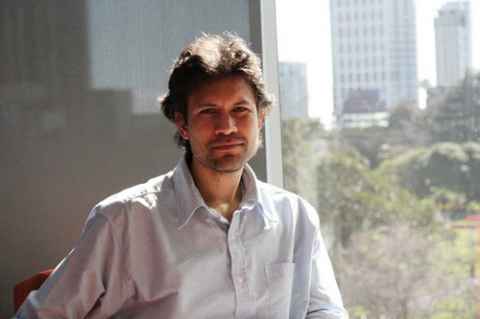Take 10 with... Sione Ma'u
Dr Sione Ma'u from the Department of Mathematics gives us 10 minutes of his time to discuss his research.

1. Describe your research to us in 10 words or less
Potential theory in several complex variables.
2. Now explain it in everyday terms!
Well, I will describe one thing in this theory: the extremal function of a compact body. Think of it as measuring a kind of energy field that extends out from the body. The extremal function is used to describe the growth of polynomials, which are an important class of functions.
If the (absolute) values of a polynomial are small on the body, they must remain small at points nearby. At points much further away, the influence of the body is weaker, and a polynomial is not so constrained: it can attain larger values. How much larger? The extremal function will tell you.
3. Describe some of your day-to-day research activities
I do calculations and draw pictures on pieces of paper. I follow up any maths I think I need to use, or learn, by searching for it on the internet. If I need a book, the university library always has a copy. I spend a lot of time writing and rewriting papers, which can be a hard slog. It is much easier with collaborators.
4. What do you enjoy most about your research?
What I enjoy the most is freely exploring ideas, especially if I come across some interesting maths or make some interesting connections. The first time I experienced that, I thought it was a one-off bit of luck. Then it happened a couple more times. These days, I believe in miracles.
5. Tell us something that has surprised or amused you in the course of your research
I once had to follow up something in an old paper I had written several years before. I was surprised to discover how much I had forgotten. I had to read it some of it slowly - it was almost like reading someone else’s paper. I also appreciated some of the subtle steps. When I was writing it the focus was on getting the paper done and submitted.
6. How have you approached any challenges you’ve faced in your research?
When I was a postdoc one of my challenges was to figure out what else to do, other than generalising my thesis further and further. So I learned to use my imagination.
The most fruitful lines of investigation have been some of the most speculative. For example, someone gave a seminar talk that featured ellipses. Were these the same ellipses that were in my thesis? Yes, they were. The relationship is completely obvious now, but at the time it was just a guess.
7. What questions have emerged as a result?
Research questions have emerged from vague speculation and playing around with calculations. Sometimes quite a bit of preliminary work is needed to figure out a good question.
8. What kind of impact do you hope your research will have?
Some of my research links different areas. I hope it helps makes tools in one area of maths accessible to researchers in a different area.
9. When you collaborate across the faculty or University, or outside the University, who do you work with and how does it benefit your research?
I collaborate with researchers who either use pluripotential theory or whose work links to it. Working with experts in numerical analysis and algebraic geometry gives me a better understanding of how my field fits into mathematics as a whole. Locally, I have worked with Dr Shayne Waldron.
10. What one piece of advice would you give your younger, less experienced research self?
Believe in yourself!